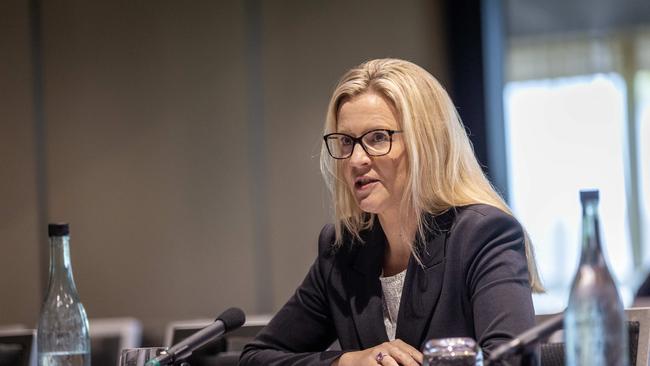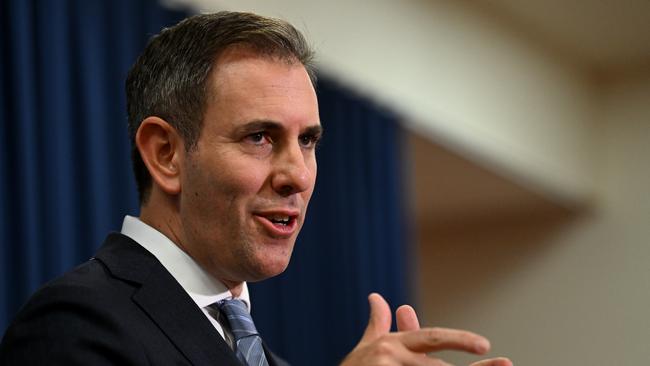APPEA figures show $16bn in tax paid this year as Jim Chalmers considers PRRT overhaul
As a major industry defends its tax payments, the government remains committed to probing whether it should be paying more.
Mining
Don't miss out on the headlines from Mining. Followed categories will be added to My News.
Industry Minister Ed Husic says it’s “a bit rich” for oil and gas companies to try to turn down the pressure ahead of suspected tax changes.
After Treasurer Jim Chalmers this week hinted at further intervention in the gas market – this time in the form of an overhaul of the resources tax – new forecasts show the industry is on track to nearly triple its revenue payments to state and federal governments this financial year.
The figures, compiled by industry body Australian Petroleum Production and Exploration Association (APPEA), show a projected windfall of $16.26bn in tax paid during 2022-23, up from $6.46bn last financial year.
The figures project by the end of June, $8.8bn of corporate income tax will have been paid, $1.85bn in petroleum resource rent tax and billions more in state royalties, excise and other taxes.
Dr Chalmers warned the oil and gas industry that Australians may not be getting a reasonable return from exports of their natural resources through the Petroleum Resource Rent Tax (PRRT), particularly amid ongoing high prices and near-record export levels
The industry has suggested it could threaten to cut investment if taxes were raised.
Mr Husic said the oil and gas companies were “doing very well” and could therefore “price in a much more moderated way”.
“At various points in time the sector doesn’t like highlighting how much profit it is benefiting from; only at the point when they want to avoid tax exposure this gets raised,” he told ABC Radio.
“My issue has been around the fact that they are doing very well, and they can price in a much more moderated way and that is one of the biggest things people are expecting – either business or household – to see occur with an Australian resource.
“No firm decision has been made, but it is a bit rich for a lot of these firms to say, well, if you make any moves here, regulatory uncertainty will force us not to invest at a time where gas prices are where they’re at.
“I’ll leave that to (others) to make their mind up as to whether or not that’s believable.”

Overnight, APPEA chief executive Samantha McCulloch said the oil and gas industry had delivered enough returns this financial year to fund the construction of around 11 new public hospitals, or 160 new schools, or cover annual healthcare for about 1.6 million Australians.
“The oil and gas industry is delivering substantially bigger returns for Australians and this $16bn will help governments funds policies like disability support and paid parental leave as well as important infrastructure like roads, schools and hospitals,” she said.
“Gas companies are among the biggest taxpayers in Australia yet face compounding regulatory interventions that risk energy security, investment and future revenue streams to governments.
“The PRRT is delivering growing return to taxpayers alongside other payments the industry makes in royalties, corporate income tax, and other fees.”

The PRRT is a tax on the profits generated from the sale of marketable petroleum commodities, namely oil and gas. An entity’s liability at current is levied at 40 per cent of the taxable profit made from its interest in the project.
Dr Chalmers has received a report from Treasury on the $2bn-a-year tax, and while he said the government has yet to finalise its position, it is widely anticipated he will announce changes to the PRRT in next month’s budget.
There is widespread criticism that the PRRT has not done enough to capture tax revenue from oil and gas companies, particularly amid high energy prices and as gas exporters are expected to break their export supply record this year.
“We’ve said for some time now that we want to make sure that the PRRT arrangements are up to scratch,” Dr Chalmers said this week, noting the review had been commissioned by the previous government.
“Clearly my predecessors had some concerns that they were not, and I have some concerns that they are not – the Australian community, I think, shares those concerns.”
Meg O’Neill, head of the country’s largest gas producer Woodside, on Wednesday urged the government against changing the PRRT.
She said “overreaching” on tax reform would undercut future revenue and choke future investment needed to increase supply.
“Our message to the government is … hold the course. Stay with the framework we have,” she told the National Press Club.
More Coverage
Originally published as APPEA figures show $16bn in tax paid this year as Jim Chalmers considers PRRT overhaul



